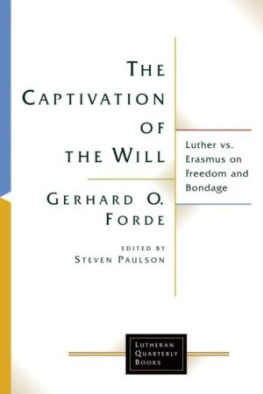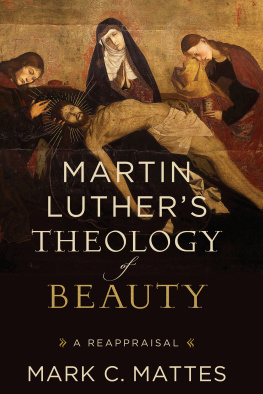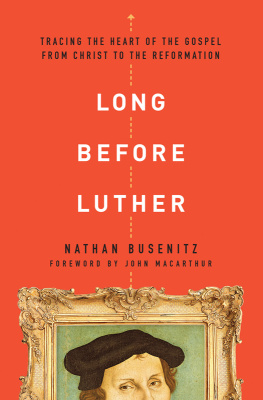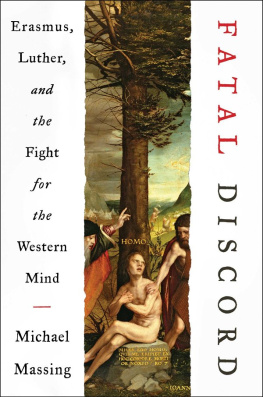Timothy J. Wengert, The Lutheran Theological Seminary at Philadelphia and Steven Paulson, Luther Seminary, St. Paul
Lutheran Quarterly Books will advance the same aims as Lutheran Quarterly itself, aims repeated by Theodore G. Tappert when he was editor fifty years ago and renewed by Oliver K. Olson when he revived the publication in 1987. The original four aims continue to grace the front matter and to guide the contents of every issue, and can now also indicate the goals of Lutheran Quarterly Books: "to provide a forum (1) for the discussion of Christian faith and life on the basis of the Lutheran confession; (2) for the application of the principles of the Lutheran church to the changing problems of religion and society; (3) for the fostering of world Lutheranism; and (4) for the promotion of understanding between Lutherans and other Christians."
For further information, see www.lutheranquarterly.com.
The symbol and motto of Lutheran Quarterly, VDMA for Verbum Domini Manet in Aeternum (1 Peter 1:25), was adopted as a motto by Luther's sovereign, Frederick the Wise, and his successors. The original "Protestant" princes walking out of the imperial Diet of Speyer 1529, unruly peasants following Thomas Muentzer, and from 1531 to 1547 the coins, medals, flags, and guns of the Smalcaldic League all bore the most famous Reformation slogan, the first Evangelical confession: the Word of the Lord remains forever.


Living by Faith: Justification and Sanctification by Oswald Bayer (2003).
Harvesting Martin Luther's Reflections on Theology, Ethics, and the Church, essays from Lutheran Quarterly edited by Timothy J. Wengert, with foreword by David C. Steinmetz (2004).
A More Radical Gospel: Essays on Eschatology, Authority, Atonement, and Ecumenism by Gerhard O. Forde, edited by Mark Mattes and Steven Paulson (2004).
The Role of Justification in Contemporary Theology, by Mark C. Mattes (2004).
The Captivation of the Will: Luther vs. Erasmus on Freedom and Bondage, by Gerhard O. Forde (2005).
Gerhard 0. Forde
With an Introduction by
James A. Nestingen
Edited by Steven Paulson





ix
xvi
Sermons

t There was something purgative, clarifying, and ultimately fruitful when Luther finally got an opponent worthy of himself, someone who quit dealing with trifles like the papacy, purgatory, or indulgences. Instead, Erasmus sought to kill what Luther called "our cause" by making it a mere reformation of the church. When Luther referred to "our cause," however, he was not speaking in the singular about himself alone, nor was he speaking in the plural merely about the faculty at Wittenberg or even the growing numbers of pastors, monks, and citizens who began taking up the preaching of the gospel. When Luther said "our cause," he was referring to the work of the triune God, no less, and specifically the cause of the Holy Spirit to make life where there is only death. Luther was convinced by Scripture and reason that the Holy Spirit worked by means of preachers who proclaimed salvation in Christ apart from the law by faith alone. This meant that early on in Luther's best book Erasmus simply became irrelevant - except as a honing wheel for Luther's own sharp theological sword. Erasmus became merely the occasion for a volcanic explosion by a theologian who had, by most other accounts, already written his best works.
The historical introduction by James Nestingen provides the background needed at this point for the circumstances around the debate and its aftermath. Nevertheless, by his own admission, Luther entered more than a debate with another theologian when he finally took up his pen to respond to Erasmus' Diatribe. Luther felt he was put again under the harsh schooling of the Holy Spirit who calls forth preachers of the law and gospel by cooking and roasting them over a spit. Erasmus was left behind while God worked with a greater theologian, and Luther was not ashamed to say it: "By your studies you [Erasmus] have rendered me also some service, and I confess myself much indebted to you.... But God has not yet willed nor granted that you should be equal to the subject of our present debate. Please do not think that any arrogance lies behind my words" (320). Small theologians shudder at this kind of statement from Luther. Who is he but another voice with another opinion? Especially in relation to the learned Erasmus! Yet while he wrote this book, Luther himself began to refine the argument that is, after all, no less than "the Reformation." It became a book not about free will as a human faculty but about Jesus Christ and the Holy Spirit who in relation with the Father are relentlessly going about justifying the ungodly.
Luther then realized what this meant for the church and its unity. Discord and schism can be ended in the church only by keeping the entire focus of theology on this central matter of the proclamation of Christ for faith alone. This is important for both those who wish to see Luther as a reformer leading a movement within the catholic church and those who see him as one more heretic and self-appointed prophet breaking the concord of the church with his bellicose rhetoric. Sedition, schism, and heresy were well underway before Luther, and were represented by both the papal party and also the new spiritual prophets popping up around Luther and claiming his teaching as their own. For that reason, Luther offered sincere praise of Erasmus along with a biting declaration of what really marks the difference between schism and unity in the church: "If those who have attacked me in the past had done as you have done, and if those who now boast of new spirits and revelations would do the same also, we should have less sedition and sects and more peace and concord. But thus it is that God, through Satan, has punished our unthankfulness" (3i9). Luther had endured years of inadequate attacks that only demonstrated the real source of discord. The proper attack upon him and his theology was necessary so that the true confession could be elicited for what makes the unity of the church: "if we believe that Christ redeemed us by His blood, we are forced to confess that all we are was lost; otherwise, we make Christ either wholly superfluous, or else the redeemer of our least valuable part only; which is blasphemy and sacrilege" (318). Gerhard Forde calls this move "taking the argument to another level." He has understood where theology's jugular vein is, just as Luther appreciated Erasmus for having exposed it so clearly even though it should also have been Erasmus' own lifeblood.


















